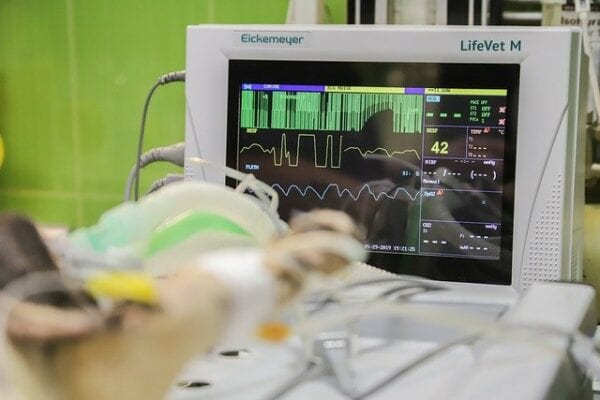Amiodarone is an older antiarrhythmic drug that you may see used in primary care and geriatrics. I’m well into my latest project on a NEW BOOK involving the prescribing cascade and polypharmacy. I wanted to share a part of it by discussing amiodarone adverse effects. Amiodarone adverse effects include things like ocular toxicity, QTc prolongation, lung toxicity, and thyroid function alterations. Here are a couple of examples of how amiodarone adverse effects could lead to the prescribing cascade.
Rarely, amiodarone can cause pulmonary toxicity and lead to breathing issues for patients. It likely causes pulmonary toxicity via the production of toxic O2 radicals and an immunological cytotoxic T cell reaction. The risk of pulmonary toxicity increases with higher cumulative doses of amiodarone. Patients who are taking a daily dose of 400 mg or more for more than two months or a daily dose of 200 mg for more than 2 years are at the greatest risk. You can listen to more on the pharmacology of amiodarone here.
So what do I watch for in clinical practice? Asking patients about their breathing when taking amiodarone chronically is very important. From a polypharmacy perspective, I’m paying attention to new respiratory medications or increased utilization. Inhaled beta-agonists, anticholinergics, or corticosteroids are all medications used to treat respiratory disorders. New prescriptions for these medications should tip you off to review the medication list and ensure that the patient isn’t taking a potentially pulmonary toxic medication like amiodarone.
Associated with breathing difficulties, patients may experience a non-productive cough as a potential sign of pulmonary toxicity. Be sure that amiodarone is not overlooked in the situation as well. If you find that a patient is taking over-the-counter cough suppressants, most are going to look at the medication list for an ACE Inhibitor which is appropriate, but this should also trigger you to think about the pulmonary risks of chronic amiodarone.
The monitoring parameter that is important to remember with regards to polypharmacy is thyroid function. Amiodarone can impact the thyroid and most commonly cause hypothyroidism (although hyperthyroidism has been reported as well). First, ensure that TSH and other thyroid labs are being monitored. From a medication perspective, pay attention to dose changes with a patient on levothyroxine and understand that amiodarone may be causing the altered function.
Looking for more on amiodarone adverse effects? Check out this previous post with a case scenario on QTc prolongation.
- 30 medication mistakes PDF
- 18+ Page Drug Interaction PDF
- 10 Commandments of Polypharmacy Webinar based on my experiences in clinical practice



0 Comments